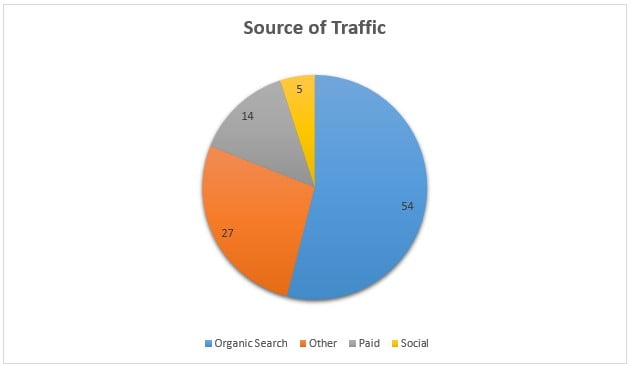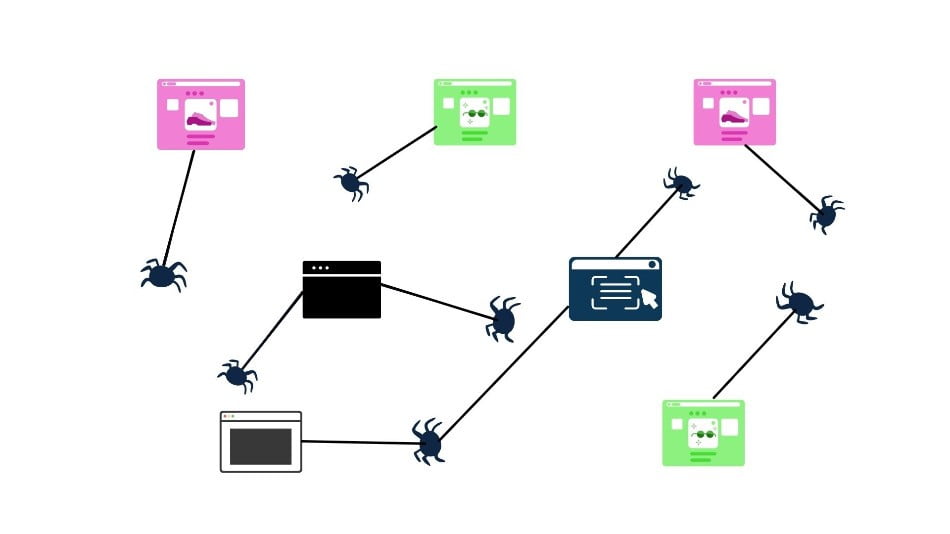In this post, we are going to know the basics of SEO. How does it work and why it is important? We have also collected a list of the best resources from where we can learn SEO.
What is SEO?
Search Engine Optimization (SEO) is the way of improving your website or webpage (appearance, content, optimization, etc.) so that the visibility of the website grows on the search engine result page (SERP). In this process, your website will be more discoverable by the targeted traffics.
Every website on the web wants to go to the first page of the search result. There are two ways to rank websites with a higher page rank. One is by paying to the search engine (Paid ad) or by SEO.
When we want information about something, we go to the search engine and search for it. The search engine will give us thousands of results relevant to the search. Some of them are on the first page. And then there would be thousands of other results on the following pages. We usually go to the first couple of websites of the SERP and gather our information. SEO helps websites to rank higher on the SERP. This way a website can get more traffics and business without paying.
How Does SEO Work?
Search engines (Google, Bing, and others) use crawlers, bots, or spiders to collect information from billions of websites and webpages on the internet and index them. When we search for something in a search engine, it will run its algorithm (set of instructions) to find the best result from the indexed information. We got to see the search results, not in a random way. A search engine will consider hundreds of ranking factors to evaluate the best matching results and make an order. By developing websites and webpages by following search engine algorithm and ranking factors, we can get a higher ranking on the SERP.
Ranking Factors
Ranking Factors can be anything addressed by a search engine. A search engine can prefer infographics or images as one of the main ranking factors. Webpages with infographics or images will be placed higher than other web pages on that search engine. Ranking factors can be different among search engines. Ranking factors are not constant. Every search engine constantly changes its algorithm or ranking factors to serve the user the best possible result.
Why is SEO Important?
Websites get their visitors from paid ads, social media, search engines, and other platforms. The majority of the visitors come from the search engine. You can get visitors by paying for ads. But over 50 percent of the total traffic comes from search engine results.
You want a website to get visitors from the organic search results. Your website needs to be ranked high on the result page. If a website ranked on the 1st page of the search engine, it would more likely get a hit. According to research, only 25% of the users go to the 2nd page of the search result, which means 75% of the users only use 1st-page results for their needs.
But how to get your website on the 1st page. Here comes SEO. If you do Search Engine Optimization of your website, your website will rank higher in SERP. That does not mean it will rank on the 1st page. SEO is a competitive process. Everyone tends to do SEO for their website to rank higher. It will take time and proper SEO management to go to the first page.

Source of Website Traffic
Benefits of SEO
There are lots of benefits of SEO in the long run. Here are few
Increased Visibility & Quality Traffic
SEO increased the visibility of a website in the search engine result. By doing SEO of a website, we can optimize the on-site content using appropriate keywords. It improves website ranks in the search result.
Organic traffic is always better than the traffic generated by paid ads. Users already know what they are looking for, and organic search results provide them according to their search queries.
User Experience
Search engine values user experience. User-friendly websites will get a higher rank on the search result. If users get quality content, faster and responsive website, they will visit the website repeatedly. The retention rate will be higher. SEO will ensure a website meets the modern search engine criteria for user experience.
Free Promotion 24/7
Paid promotion depends on the promoter’s requirement and budget. If you want a 24/7 promotion, you will need a higher budget. SEO does not require any payment to put a website on the higher ranking on search results. Your website will get 24/7 promotion if you have a good SEO strategy. Your brand will get recognition.
SEO vs PPC Ads
PPC ads are positioned higher than organic search results. However, the visitors usually know which websites are PPC generated and which are not. They tend to go to websites, which are not PPC ads. As a result, SEO-optimized websites will get a high conversion rate than PPC-generated websites. PPC ads can generate short-term leads. But, in the long-term organic search result will always win.
Engagement Rates & Increased ROI
SEO-optimized site is very much crucial in bringing quality traffic. Customers will spend longer on a website if it has good content and user friendly. It will connect them with the brand more. Engagement with the website will be more. It will also increase the ROI (Return on investment).
Disadvantages of SEO
There are very few disadvantages of SEO.
Long-Term Strategy
The most noticeable downside of SEO is it takes time to produce the result. SEO will not guarantee any immediate customers for your business. SEO optimize business will grow gradually over time. There is no time limit for SEO success. Google says SEO takes 4-12 months to produce results.
Result Not Guaranteed
SEO does not guarantee first-page results in the search engine. Google Says, they change their algorithms and ranking factors constantly. If any organization claims that they can move your website to the 1st page by doing SEO. They cannot.
Not Free
It is not true that SEO is completely free. If you are not doing all the SEO work, you may need professional help with SEO marketing. There are paid tools that can help with the SEO process. This is required if you are entering a competitive market. You have to make your SEO strategy better than your competitor. Free tools can get you results. But paid tools give you the edge.
How to Learn SEO?
Learning SEO does not require a lot of technical knowledge. Knowledge of coding or programming is not mandatory. However, some understanding is preferable. You have to read a lot to learn SEO. There are tons of websites, blogs, and tools, from which you can learn SEO. You need to update yourself about the latest development to be a successful SEO professional.
SEO learning is not only theoretical; it has many things that need to do in practice. It is a combination of both. You need to learn all the development and apply them in practice.
In this post, we will not go into the details of learning SEO. However, we have assembled a list of best resources from where you can learn SEO.
8 Best Resources to Learn SEO
We have reviewed and compiled a list of the best resources to learn SEO.
Google Search Central Blog
Here you can find all core algorithm updates of Google search engine, new search features, and SEO best practices. It is a must for SEO professionals.
The Moz Blog
From Moz Blog, you can learn SEO step by step. It contains tons of blog posts related to SEO. They have Moz Pro, an SEO tool. It can do almost anything related to SEO.
Semrush Blog
It is not only about SEO. They also write about SEM, PPC, SMM, content marketing, and more. They have SEO tools and an academy. You can participate in exams and get a certificate from their academy.
Ahrefs Blog
Ahrefs has an SEO blog and tools. Their tool for link building is industry-leading. They have a backlink index that contains over 3 trillion live backlinks. Ahrefs Webmaster Tools is free to use. It helps to improve website performance and monitor the website’s SEO health.
Backlinko
Brian Dean, the founder of Backlinko, is one of the top SEO experts in the world. His blog contains lots of SEO case studies. Backlinko has a post about SEO Tools, which is very much handy to SEO professionals.
Neil Patel Blog
Neil Patel’s Blog is one of the best blogs for SEO learning. Apart from his free blog post, you can also subscribe to his paid training program. The blog contains a lot of tools such as SEO Analyzer, Backlinks Checker, etc.
Yoast SEO Blog
Yoast is a plugin for WordPress which helps to optimize your website. It has free online SEO training. Also, they have a premium SEO course which is very good.
Learning SEO
There is a roadmap for SEO on this website. We find it very much helpful in learning SEO. They have different sections for different purposes, such as the Free SEO Tools page. There are tons of tools for SEO mentioned here.
Please excuse us, if we miss mentioning some blogs with quality content for SEO learning. We have tried our best to figure out the best resources to learn SEO. There are lots of SEO blogs out on the internet. We will go through with their posts and let you know about their strengths.
As for us, we are not only an SEO platform. We tend to seek various aspects of tech. But one of our pages is dedicated to SEO. We are going to bring lots of quality content about SEO for you.
Stay with us and keep learning.


There is definately a lot to find out about this subject. I like all the points you made
I just like the helpful information you provide in your articles
You’re so awesome! I don’t believe I have read a single thing like that before. So great to find someone with some original thoughts on this topic. Really.. thank you for starting this up. This website is something that is needed on the internet, someone with a little originality!
I like the efforts you have put in this, regards for all the great content.
I truly appreciate your technique of writing a blog. I added it to my bookmark site list and will
Hi there to all, for the reason that I am genuinely keen of reading this website’s post to be updated on a regular basis. It carries pleasant stuff.
This is really interesting, You’re a very skilled blogger. I’ve joined your feed and look forward to seeking more of your magnificent post. Also, I’ve shared your site in my social networks!
This is my first time pay a quick visit at here and i am really happy to read everthing at one place
very informative articles or reviews at this time.
Great information shared.. really enjoyed reading this post thank you author for sharing this post .. appreciated
This is my first time pay a quick visit at here and i am really happy to read everthing at one place
I truly appreciate your technique of writing a blog. I added it to my bookmark site list and will
For the reason that the admin of this site is working, no uncertainty very quickly it will be renowned, due to its quality contents.
You’re so awesome! I don’t believe I have read a single thing like that before. So great to find someone with some original thoughts on this topic. Really.. thank you for starting this up. This website is something that is needed on the internet, someone with a little originality!
Awesome! Its genuinely remarkable post, I have got much clear idea regarding from this post
This is really interesting, You’re a very skilled blogger. I’ve joined your feed and look forward to seeking more of your magnificent post. Also, I’ve shared your site in my social networks!
Great information shared.. really enjoyed reading this post thank you author for sharing this post .. appreciated
Great information shared.. really enjoyed reading this post thank you author for sharing this post .. appreciated
I truly appreciate your technique of writing a blog. I added it to my bookmark site list and will
I’ve been exploring for a little bit for any high-quality articles or weblog posts on this sort of area . Exploring in Yahoo I ultimately stumbled upon this website. Reading this information So i’m glad to exhibit that I have a very just right uncanny feeling I discovered just what I needed. I so much without a doubt will make sure to don’t omit this site and provides it a glance on a constant basis.
I like the efforts you have put in this, regards for all the great content. Best Regards, Ceo, Rafusoft.com
Very well presented. Every quote was awesome and thanks for sharing the content. Keep sharing and keep motivating others.
Hello to every one, the contents existing at this webb page are truly remarkable for people knowledge, well, keep up the gopd work fellows.
very informative articles or reviews at this time.
If somee one needs expert view concerning blogging
then i advis him/her to visit this website, Keeep up the fastidious work.
Hey there! I’m at work surfing around your blog rom my
new iphone! Just wanted to say I love reading your blog
and look forward too all your posts! Carry on thee outtanding work!
I simply could nnot depart your web site before suggesting that I
really enjoyed the usual information a person provide in your guests?
Is going to bbe again steadily in order to check up on new
posts
Wow, awesome bllog layout! How long have you been blogging for?
you make blogging look easy. The overall look of your web site
is excellent, as well as the content!
Excellent, what a webpage it is! This website gives useful information to us,
keep it up.
I am really impressed witgh yoir writing skills and also
with the layout on your blog. Is this a paid thheme or diid you modify
it yourself? Either way keep up the nice qualit writing, it’s rare
to see a great blog like this one nowadays.
You could defknitely see your expertise in the article you write.
The sector hopes for ven more passionate writers like you who
are not afraid to say how they believe. All
the timee follow your heart.
Please let mee know if you’re loking for a article author for
your blog. You have some really good articles and I
believe I would be a good asset. If you ever
want to take some of the load off, I’d love to wrfite some articles for your blog in exchange for a link back to mine.
Please blast me an email if interested. Many thanks!